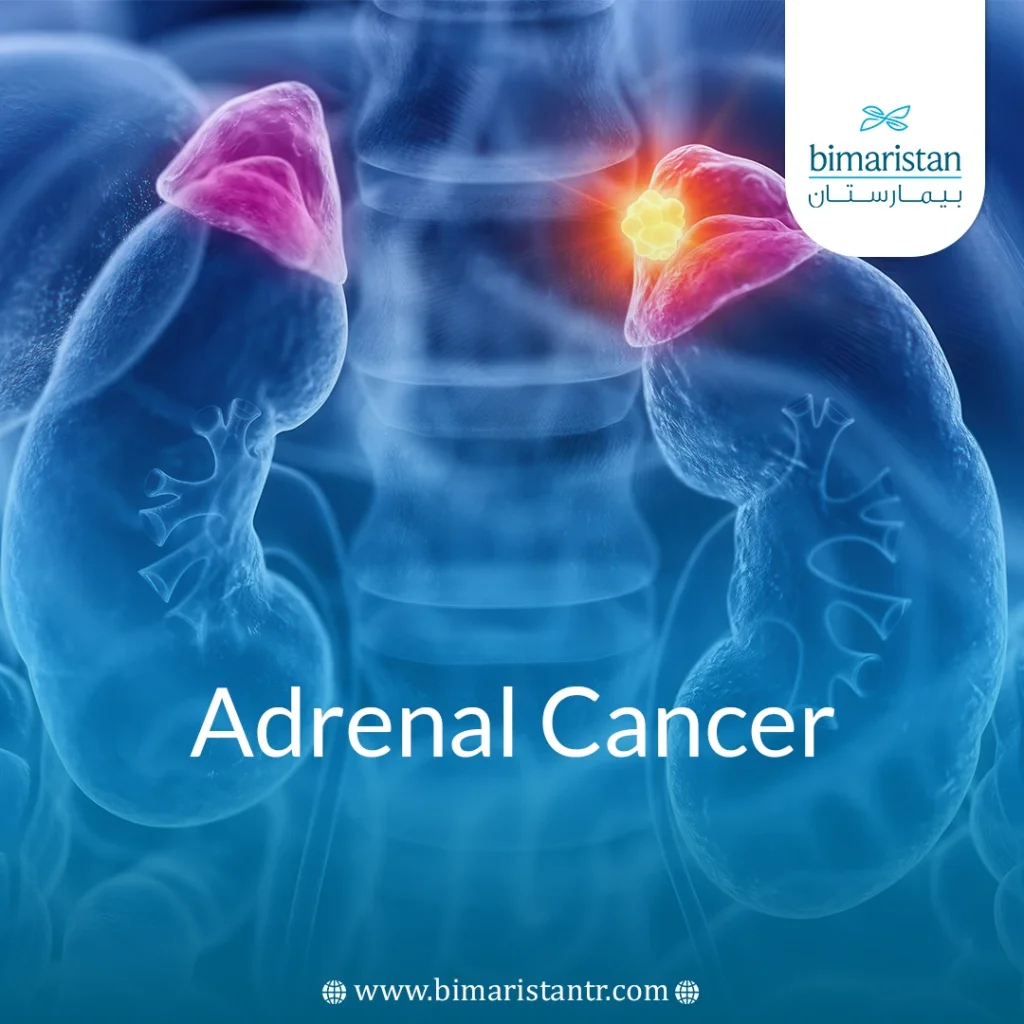Adrenal cancer is a rare malignancy that develops in the adrenal glands, which play a crucial role in hormone secretion. It is known for its aggressive progression and ability to metastasize. Adrenal cancer demands early detection and targeted treatment to improve health outcomes. Recognizing risk factors and symptoms is essential for increasing recovery chances and enhancing patients’ quality of life.
Types of adrenal cancer
There are two primary types of adrenal cancer:
- Primary Adrenal Cancer: This form develops from cells of the adrenal gland, tends to be more prevalent, and is often characterized by rapid progression.
- Secondary Adrenal Cancer: Occurs when cancer cells spread from other parts of the body to the adrenal gland, such as breast cancer or lung cancer.
Causes and risk factors for adrenal cancer
Causes of adrenal cancer involve several factors:
- Genetic Factors: Specific genetic syndromes, such as Li-Fraumeni and Cohen syndrome, may elevate the risk of adrenal cancer. Those with a family history of these conditions should be aware of their health.
- Environmental Factors: Exposure to harmful substances like pesticides and heavy metals may contribute to the onset of adrenal cancer.
- Family History: A family history of various cancers can increase the risk of developing adrenal cancer, making regular screenings essential.
Symptoms and signs of adrenal cancer
Adrenal cancer can present with various signs and symptoms, which may differ among individuals. Below are the most common symptoms:
- Weight Gain: Unexplained weight gain or abnormal fat distribution, often noticeable in the abdomen and face.
- Mood Changes: Patients may experience mood swings, including depression or anxiety.
- High Blood Pressure: Adrenal cancer can cause persistently high blood pressure, requiring medical assessment.
- Changes in Blood Sugar Levels: Symptoms such as excessive thirst or frequent urination may signal diabetes.
- Hormonal Symptoms: These may include acne, menstrual irregularities in women, or increased hair growth.
- Abdominal or Back Pain: Some individuals may suffer from persistent pain in these areas.
- Unexplained Weight Loss: Sudden weight loss without dietary or exercise changes.
- Severe Fatigue: Persistent tiredness or general weakness affecting daily activities.

Diagnosis of adrenal cancer
The diagnosis of adrenal cancer involves several key tests:
- X-rays: Used to detect tumors and evaluate their size.
- Magnetic Resonance Imaging (MRI): It provides detailed images of the adrenal glands, helping assess cancer spread.
- Lab Tests: Measure hormone levels in the blood, as elevated levels may indicate adrenal tumors.
- Biopsy: A tissue sample is examined under a microscope to confirm the presence of malignancy.
Adrenal cancer treatment
Treatment options for adrenal cancer include:
- Surgery: The primary approach for early-stage tumors, often involving complete adrenal gland removal.
- Chemotherapy: Sometimes administered post-surgery to reduce relapse risk, especially in advanced cases.
- Radiation Therapy: Helps shrink tumors or alleviate symptoms when surgery can’t be performed.
- Targeted Therapies: Designed to attack cancer cells directly while minimizing harm to healthy tissue.
Recent research explore new drugs aimed at enhancing treatment outcomes.
Living with the disease
Patients with adrenal cancer require strong psychosocial support. Support groups offer a valuable space for connection, enabling individuals to share their experiences and cope with challenges. Maintaining a healthy diet and engaging in regular exercise are also essential for overall well-being.
Adrenal cancer is a rare condition that demands early awareness and accurate diagnosis to improve treatment outcomes. Patients can protect and maintain their health by recognizing symptoms and risk factors. Comprehensive psychosocial support, combined with effective medical care, plays a crucial role in enhancing quality of life and helping patients manage their disease.
Sources:
- Urology Care Foundation. (n.d.). Adrenal Gland Cancers. UrologyHealth.org
- American Cancer Society. (n.d.). What Is Adrenal Cortical Cancer?

